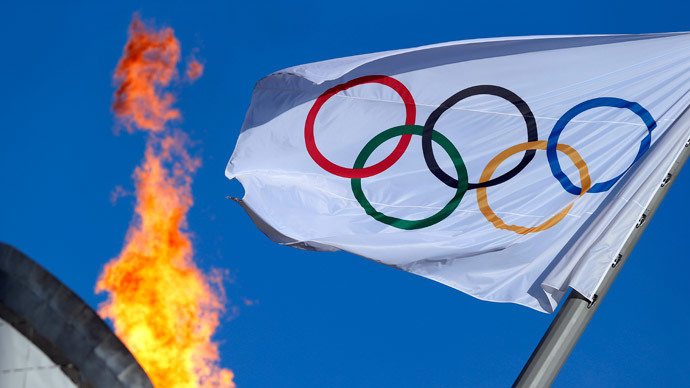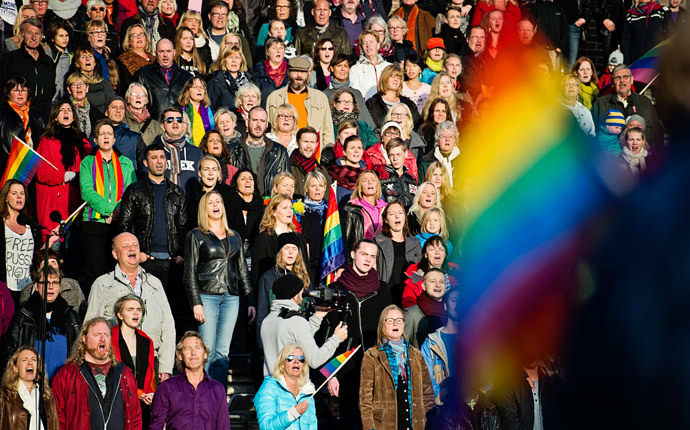Sochi Games under fire: 'Pravda on the Potomac' and elsewhere

When Baron Pierre de Coubertin founded the International Olympic Committee (IOC) in 1894, he must have been motivated by the hope of reviving sporting competitions on the pattern of the Olympic Games in Ancient Greece.
De Coubertin's contemporaries noted that he wished to create a festive atmosphere around the Games, to be imbued with the noblest human aspirations and emotions.
The IOC Statute specifically emphasizes that interference of politics in the preparation and conduct of the Olympics is utterly impermissible. Pierre de Coubertin could hardly have been so naive as to believe that the statute would be strictly complied with. Still, he certainly did not imagine the extent of the impact on the Games by political intrigue, as well as unbelievable commercialization, boycotts, bribery, doping, and on two occasions - in Munich in 1972 and in Atlanta in 1996 - even terrorist acts.
The Sochi Olympiad, or rather the epiphenomena connected with it, beat all previous records in terms of the scale of political interference and of the ferocity of world media attacks aimed at boycotting or disrupting the Games. We are witnessing a species of odd symbiosis between such motley groups as traditional Russophobes, Cold Warriors, radical elements among the LGBT community and human rights organizations, as well as some individuals within the Russian liberal circles who, along with Islamist extremists, openly talk of inflicting moral or physical damage on the Olympiad. The impression is that all of those groups would dearly love to see the Games fail ignominiously, while a successful completion of the Olympics would mean a personal disaster for them.

The Western press is doing its damnedest to broadcast across the world any faultor mishap at the Games - from a broken toilet bowl or a stray dog spotted in the street to terrorist threats - frequently in a grossly inflated form to enhance the effect. Until recently, it was virtually impossible to find a single good word about the Olympiad in the Western media; it was truly touching to watch the glee of the Games' ill-wishers when one of the Olympic rings failed to unfold during the opening ceremony.
One of the more revolting episodes in this mass hysteria was the monstrous and nauseating insinuation - the drawing of parallels between Sochi 2014 and Berlin 1936. Without stooping to argue with those who make such comparisons, I would like to remark that if there are any parallels with Germany to be drawn, it is not with Berlin in 1936, but with Munich in 1938.
It was in that year that Britain and France made the notoriously disgraceful concessions to Hitler and Mussolini, which played a significant role in encouraging Nazi Germany to start WWII. And now Washington Post correspondent Sally Jenkins castigated the IOC for choosing Sochi to conduct the 2014 Olympics despite threats from terrorists. It appears that from now on, IOC members will have to consult terrorists and appease them in selecting a venue for the Games, in the manner of British PM Chamberlain and his colleagues in Munich in 1938.
The Washington Post has for years been the indisputable world champion in anti-Russian propaganda. Its language in pieces devoted to Russia clearly differs from the standards accepted in Western journalism; in fact, its style is uncannily similar to that of the Soviet communist daily Pravda in the not so distant past. No wonder its soubriquet, “Pravda on the Potomac," is getting increasingly popular - so much so that it occasionally occurs even in mainstream Western media.
To be fair, over the last couple of days the Western press - apparently waking to the criticism of indignant readers and commentators - has somewhat mitigated the vitriolic drive of its Sochi Games coverage. One could see some limited praise for the organizers and it was indeed heartening to hear Donald Trump - hardly the biggest admirer of Russia or Putin - to politely rebuke the Fox News anchor by saying that it was perhaps about time to give Russians a break and note something good about Sochi, when the guy kept pushing him toward yet another portion of criticism.
Meanwhile, the Olympiad in Sochi follows its course and, pray God, will end in resounding success. However, let us face the reality: it does not look like the future Olympiads will be able to revive the ideals of the Games as conceived by their founders in Ancient Greece and by Baron de Coubertin.
Edward Lozansky for RT
Edward Lozansky is president of American University in Moscow, and a professor at Moscow State University and National Research Nuclear University.
The statements, views and opinions expressed in this column are solely those of the author and do not necessarily represent those of RT.
The statements, views and opinions expressed in this column are solely those of the author and do not necessarily represent those of RT.












